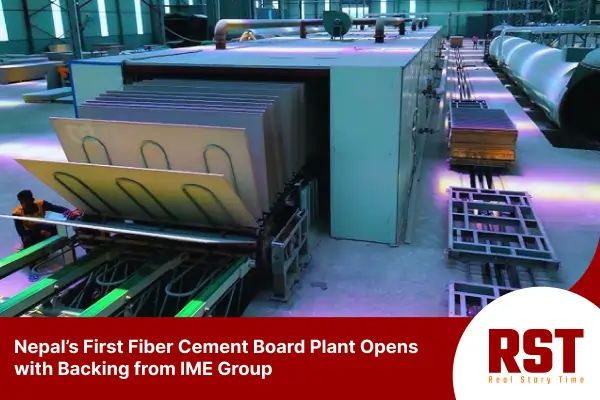Nepal’s First Fiber Cement Board Plant Opens with Backing from IME Group
By Kushal Shrestha - Jul 1, 2025 | Updated: July 1, 2025 | 3 min read

Everest Fiber Cement Board Industry, Nepal’s first-ever Fiber Cement Board Plant in Nepal, with an investment of Rs 1.5 billion by IME Group, has officially begun operations in Fatuwa Bijaypur Municipality–6 of Rautahat District. This state-of-the-art, fully automated plant can produce 75,000 sq. ft. of fiber cement boards daily, marking a historic milestone in Nepal’s industrial and construction sectors.
The Fiber cement boards come in a range of sizes, ranging from 4 ft x 8 ft, with a thickness of 4 mm to 30 mm. These boards are strong, sustainable, and environmentally friendly, as they are non-combustible, waterproof, flexible, and reportedly durable. According to the manufacturers, these can be used for interior cladding, exterior cladding, partitions, false ceilings, and modular kitchens. They also provide the option of standing in place of bricks and plaster, thus rendering the construction process speedy, taking about 10 to 15 days.
Developed to target both domestic and foreign markets, the Fiber Cement Board Plant in Nepal offers rapid deployment options for disaster-prone areas that require strong emergency shelters during earthquakes and floods.
At the opening ceremony of the plant, Minister Damodar Bhandari described it as a landmark in Nepal’s transition toward self-sustained industrial growth. “This is a high-quality, environmentally responsible, and technically advanced project, an example of what the future industry of Nepal would be,” he said.
The chairman of the IME Group and president of FNCCI, Chandra Prasad Dhakal, declared that the entire event symbolizes a matter of pride related to the employment of domestic raw materials and local resources in contributing to Nepal’s construction sector.
“The industry would generate employment, save foreign currency through import substitution, and help build a more self-reliant economy,” he said, highlighting how the project reflects Nepal’s capability to manufacture world-class building materials using indigenous skills and assets.
The Fiber Cement Board Plant in Nepal has employed over 200 people, with nearly 98% of them being local, and more than 40% being women. The workers perform everything from converting raw materials to packaging, creating a community-oriented workplace.
READ MORE: Bodhisattva Swami Anand Arun: Spreading Osho’s Vision Globally
The Fiber Cement Board Plant is a new addition, thereby diversifying the IME Group’s portfolio alongside finance, paper production, cement, IT, and tourism. This is another feather in the cap of manufacturing ventures, including Nepal Pulp and Paper Industries in Mahottari, to further intensify the Group’s drive towards import substitution and local value addition.
While concerns such as energy reliability and quality certification are still acknowledged, both the Company and its staff believe that modern automation, skilled labor, and local sourcing will ensure the company remains competitive in Nepal and its neighboring markets.
The opening of the Everest Fiber Cement Board Industry is not simply a victory that carries IME Group forward, but also a beacon of hope for developing Nepal as a regional center for the sustainable building materials industry. As the very first fully functioning Fiber Cement Board Plant in Nepal, it is a shining example of how local innovation and investment can foster sustainable development.
Notice an error?
Help us improve by submitting a correction.







